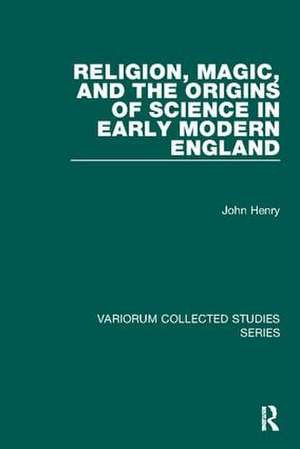Religion, Magic, and the Origins of Science in Early Modern England: Variorum Collected Studies
Autor John Henryen Limba Engleză Paperback – 22 mai 2017
Din seria Variorum Collected Studies
- 9%
 Preț: 938.85 lei
Preț: 938.85 lei -
 Preț: 311.41 lei
Preț: 311.41 lei -
 Preț: 351.48 lei
Preț: 351.48 lei -
 Preț: 313.38 lei
Preț: 313.38 lei -
 Preț: 386.77 lei
Preț: 386.77 lei -
 Preț: 325.68 lei
Preț: 325.68 lei -
 Preț: 396.00 lei
Preț: 396.00 lei -
 Preț: 312.75 lei
Preț: 312.75 lei - 9%
 Preț: 1041.23 lei
Preț: 1041.23 lei -
 Preț: 258.66 lei
Preț: 258.66 lei -
 Preț: 299.55 lei
Preț: 299.55 lei - 9%
 Preț: 938.08 lei
Preț: 938.08 lei -
 Preț: 343.33 lei
Preț: 343.33 lei -
 Preț: 311.18 lei
Preț: 311.18 lei - 9%
 Preț: 937.13 lei
Preț: 937.13 lei -
 Preț: 351.41 lei
Preț: 351.41 lei -
 Preț: 320.00 lei
Preț: 320.00 lei - 34%
 Preț: 764.20 lei
Preț: 764.20 lei - 23%
 Preț: 315.48 lei
Preț: 315.48 lei - 36%
 Preț: 740.06 lei
Preț: 740.06 lei - 34%
 Preț: 764.20 lei
Preț: 764.20 lei - 34%
 Preț: 680.73 lei
Preț: 680.73 lei - 26%
 Preț: 247.40 lei
Preț: 247.40 lei - 34%
 Preț: 485.78 lei
Preț: 485.78 lei - 38%
 Preț: 766.91 lei
Preț: 766.91 lei - 34%
 Preț: 767.07 lei
Preț: 767.07 lei - 34%
 Preț: 764.20 lei
Preț: 764.20 lei - 34%
 Preț: 769.51 lei
Preț: 769.51 lei - 38%
 Preț: 769.85 lei
Preț: 769.85 lei - 34%
 Preț: 826.68 lei
Preț: 826.68 lei - 25%
 Preț: 225.28 lei
Preț: 225.28 lei - 25%
 Preț: 225.54 lei
Preț: 225.54 lei - 34%
 Preț: 736.38 lei
Preț: 736.38 lei - 34%
 Preț: 738.43 lei
Preț: 738.43 lei - 25%
 Preț: 226.52 lei
Preț: 226.52 lei - 33%
 Preț: 491.66 lei
Preț: 491.66 lei - 34%
 Preț: 485.78 lei
Preț: 485.78 lei - 34%
 Preț: 485.78 lei
Preț: 485.78 lei - 36%
 Preț: 739.17 lei
Preț: 739.17 lei - 38%
 Preț: 766.34 lei
Preț: 766.34 lei - 31%
 Preț: 473.94 lei
Preț: 473.94 lei - 18%
 Preț: 843.61 lei
Preț: 843.61 lei - 38%
 Preț: 774.91 lei
Preț: 774.91 lei - 38%
 Preț: 769.92 lei
Preț: 769.92 lei - 34%
 Preț: 764.20 lei
Preț: 764.20 lei - 51%
 Preț: 485.78 lei
Preț: 485.78 lei - 36%
 Preț: 488.49 lei
Preț: 488.49 lei - 34%
 Preț: 769.10 lei
Preț: 769.10 lei - 38%
 Preț: 766.99 lei
Preț: 766.99 lei - 18%
 Preț: 1019.01 lei
Preț: 1019.01 lei
Preț: 341.58 lei
Preț vechi: 396.00 lei
-14% Nou
Puncte Express: 512
Preț estimativ în valută:
65.36€ • 68.43$ • 54.08£
65.36€ • 68.43$ • 54.08£
Carte tipărită la comandă
Livrare economică 05-19 aprilie
Preluare comenzi: 021 569.72.76
Specificații
ISBN-13: 9781138117075
ISBN-10: 1138117072
Pagini: 328
Dimensiuni: 152 x 229 mm
Greutate: 0.61 kg
Ediția:1
Editura: Taylor & Francis
Colecția Routledge
Seria Variorum Collected Studies
Locul publicării:Oxford, United Kingdom
ISBN-10: 1138117072
Pagini: 328
Dimensiuni: 152 x 229 mm
Greutate: 0.61 kg
Ediția:1
Editura: Taylor & Francis
Colecția Routledge
Seria Variorum Collected Studies
Locul publicării:Oxford, United Kingdom
Cuprins
Contents: Preface; Animism and empiricism: Copernican physics and the origin of William Gilbert's experimental method; Atomism and eschatology: Catholicism and natural philosophy in the Interregnum; Occult qualities and the experimental philosophy: active principles in pre-Newtonian matter theory; Medicine and pneumatology: Henry More, Richard Baxter and Francis Glisson's Treatise on the Energetic Nature of Substance; The matter of souls: medical theory and theology in 17th-century England; Henry More versus Robert Boyle: the spirit of nature and the nature of providence; Boyle and cosmical qualities; Robert Hooke, the incongruous mechanist; 'Pray do not ascribe that notion to me': God and Newton's gravity; The fragmentation of Renaissance occultism and the decline of magic; Index.
Notă biografică
John Henry is Professor Emeritus and Director of Science Studies Unit, School of Social and Political Science, University of Edinburgh, UK
Recenzii
'With this collection, Henry offers a surprising and innovative perspective on the intellectual history of early-modern Europe with particular attention to the impact of theology and Christian faith on philosophical and scientific views of natural reality.' Catholic Historical Review 'This work will be of great use to scholars and particularly valuable for postgraduates who are coming to grips with the historiography of early modern chymistry, religion, and magic. I recommend it highly.' Ambix
Descriere
In these articles John Henry argues for the intimate relationship between religion and early modern attempts to develop new understandings of nature, and on the other hand for the role of occult concepts in early modern natural philosophy. The articles provide detailed examinations of the religious motivations behind Roman Catholic efforts to develop a new mechanical philosophy, theories of the soul and immaterial spirits, and theories of active matter. There are also studies of animism in the beginnings of experimentalism, the role of occult qualities in the mechanical philosophy, and a new account of the decline of magic. The collection also includes in depth studies of William Gilbert, Sir Kenelm Digby, Henry More, Francis Glisson, Robert Boyle, Robert Hooke and Isaac Newton.
